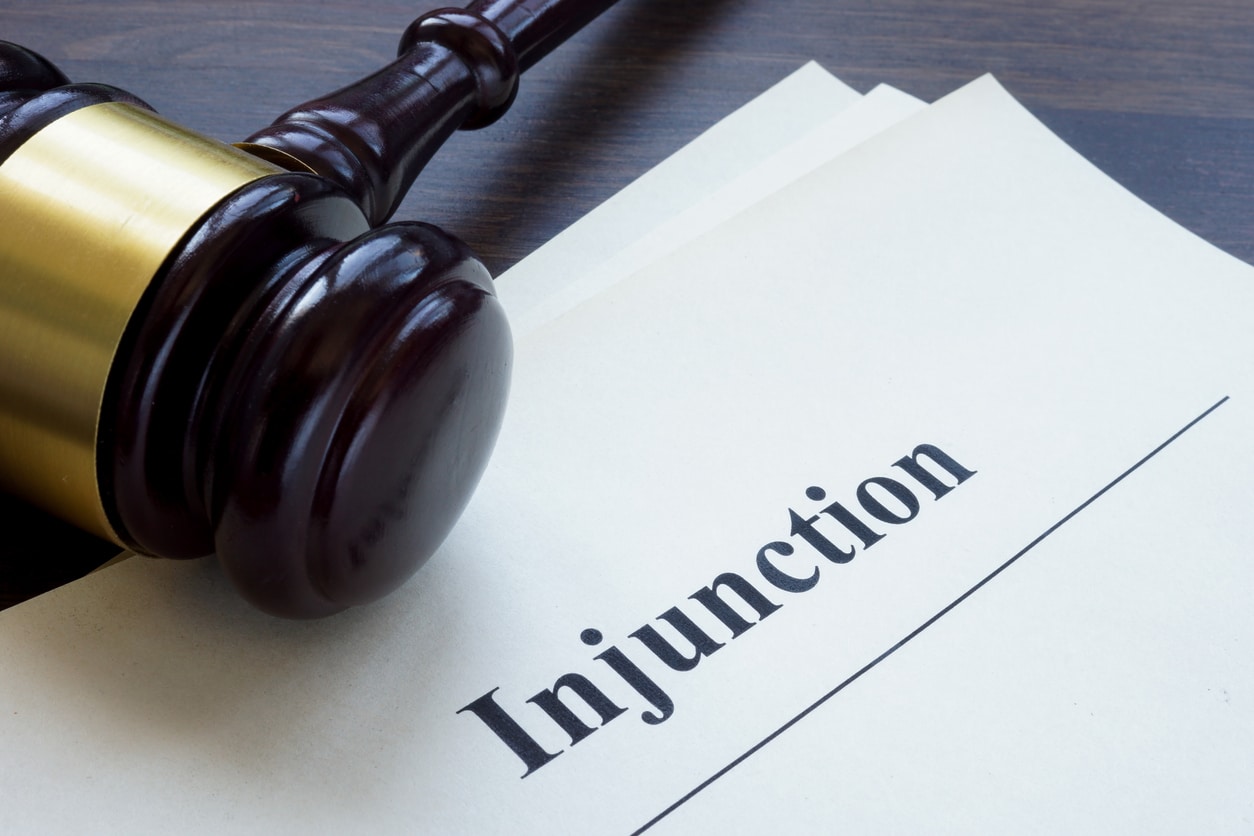Most legal judgments within the United States are remedial. They typically involve monetary awards for damages in civil cases and jail terms, fines or other penalties in criminal cases.
Distinction between cases in law and equity
As courts of law developed in Great Britain, from which the U.S. legal system is largely derived, courts of equity were established alongside other courts of law not simply to punish past actions but also to prevent future harm. They typically did so by issuing injunctions or restraining orders against actions that were anticipated to cause such harms. American courts have the authority to deal with actions arising either in law or in equity.
Use of preliminary injunctions and types of injunctions
From time to time, individuals will ask for preliminary injunctions against the enforcement of policies that they believe are contrary to the First Amendment. An ex parte restraining order, preserving the status quo, may be issued at a plaintiff’s request without a full court hearing. Temporary injunctions, which may be issued after a full hearing, apply for a limited time, while permanent injunctions remain in effect indefinitely. Such injunctions bind defendants and their agents. If issued to public officials, these injunctions bind the office as well as the individual litigant (Murphy & Pritchett 1986, 248).
After judges issued more than 1,600 injunctions against implementing New Deal programs, Congress tightened the rules, especially for injunctions against labor strikes. Other injunctions have increased in recent years, especially during Donald Trump’s second administration during which he has relied heavily on executive orders.
For example, in 2025, plaintiffs obtained a temporary restraining order against the government’s attempt to fire employees of the U.S. Agency for Global Media, which includes the Voice of America that broadcasts news in areas governed by authoritarian regimes. Similarly, after lower courts rejected a preliminary injunction against policies in Montgomery County, Maryland, that prevented parents of elementary school children from withdrawing their children from lessons that involved LGBTQ issues, the Supreme Court expedited its hearing of the case in Mahmoud v. Taylor (2025).
There is a fairly high bar to preliminary injunctions. In a U.S. District Court ruling in Mennonite Church USA v. U.S. Department of Homeland Security (2025), involving a request to limit immigration raids in or near churches, for example, the judge declined to issue an injunction. He observed that precedents established that courts should do so only in cases that established “likely success of the merits, likely irreparable harm in the absence of preliminary relief, a balance of the equities in its favor, and accord with this public interest.”
Injunctions and the First Amendment
Under American Law, courts consider that “The loss of First Amendment freedoms, for even minimal periods of time, constitutes irreparable injury for purposes of the issuance of a preliminary injunction” (14A C.J.S. Civil Rights Section 369).
In the path-breaking decision in Near v. Minnesota (1931), the U.S. Supreme Court indicated opposition to prior restraint of publications (in this case, a newspaper), a stance that it reaffirmed in the Pentagon Papers case of New York Times Co. v. U.S. (1971). In accord with its presumption against prior restraint, the court does not generally issue injunctions against libel or obscenity (Lemley and Volokh, 1998), although Professor David S. Ardia has argued that there are occasions involving social media where injunctions would be appropriate in cases involving “false statements on matters of private concern that a court has found — after full adjudication — are defamatory” (2013-2014, 2).
In Snepp v. United States (1980), the court enforced an agreement made by an ex-CIA agent requiring him to submit publications involving the agency to prior review against charges that such a review violated his First Amendment rights.
Individuals who violate injunctions can be subject to either civil or criminal contempt. In Walker v. City of Birmingham (1967), the U.S. Supreme Court upheld the punishment of individuals who violated an injunction against holding a civil rights parade (an action that was almost surely unconstitutional) without first seeking to file an appeal.
Ongoing issues and developments
Although the Justice Department is generally responsible for bringing cases against individuals who have committed contempt of court, a judge can appoint a private attorney in cases where that department might fail to intervene. This possibility has been raised for a potential contempt of court charge that U.S. District Judge James Boasberg is threatening if the Trump Administration fails to return Venezuelan migrants whom the Trump Administration has sent to a prison in El Salvador without due process.
As the number of injunctions has risen dramatically, the Trump Administration has questioned whether a single federal judge should be able to issue preliminary injunctions that affect the entire nation, particularly concerning immigration and deportation policies. The U.S. Supreme Court is scheduled to hear a case on May 15, 2025, involving three lower court injunctions against the implementation of an executive order by President Donald J. Trump attempting to limit birthright citizenship under the 14th Amendment to individuals born in the U.S. to parents who are legally in the country.
John R. Vile is a political science professor and dean of the Honors College at Middle Tennessee State University.

